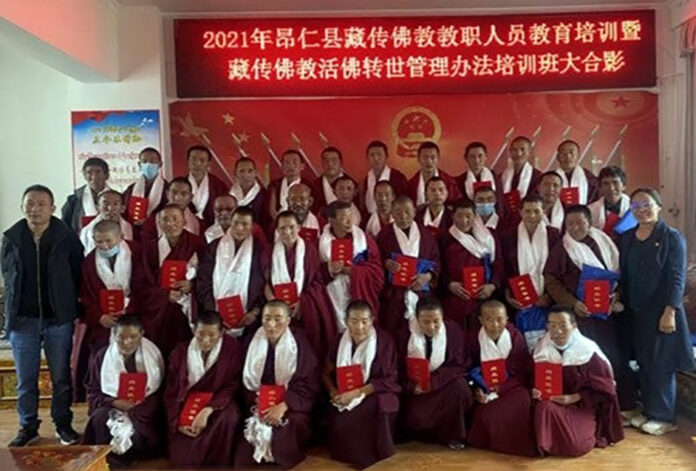
(TibetanReview.net, Dec16’21) – China has launched a new campaign in occupied Tibet to educate its grassroots officials and others on the atheist party-state’s policy on the recognition of Tibetan Buddhist reincarnations. It began in late November in three townships in northern Tibet’s Sog County which has a history of resistance to state controls on religion, said New York-based Human Rights Watch in a new report Dec 15.
A senior local Chinese Communist Party official toured these townships to carry out the education campaign. Those who attended the sessions included “over 120 township officials, staff of monastery management committees, village-based cadres, village officials, local police, [and] schoolteachers,” the group said, citing China’s state media.
Participants “unanimously declared their willingness to follow laws and regulations concerning Tibetan Buddhist incarnation affairs,” the media report was quoted as saying.
China’s law especially since 2007 requires all reincarnations of Tibetan Buddhism to be approved by it in a process involving its various agencies. Candidates for recognition and approval need to be born in the People’s Republic of China.
High-ranking incarnations must be selected by use of a “Golden Urn,” an 18th century lottery system proposed by a Chinese emperor as an additional process to avoid controversies but was scarcely, if ever, used by Tibetans. In its 2007 new regulations, the Chinese party-state mandated it as the only legal way to select Tibet’s top-ranking lamas.
The move is seen as only the latest in China’s preparations for what officials call the “post-Dalai era”.
The group noted that in recent years, Chinese officials had announced meetings where selected senior monks were required to “study” these policies and promise their support.
Since 2018, all monastics, particularly those with teaching or official duties, had been required to meet “Four Standards,” including “political reliability” and “being dependable at critical moments.” Both are believed to involve support for the Chinese government’s choice of the next Dalai Lama and any other reincarnate lama, the group said.




